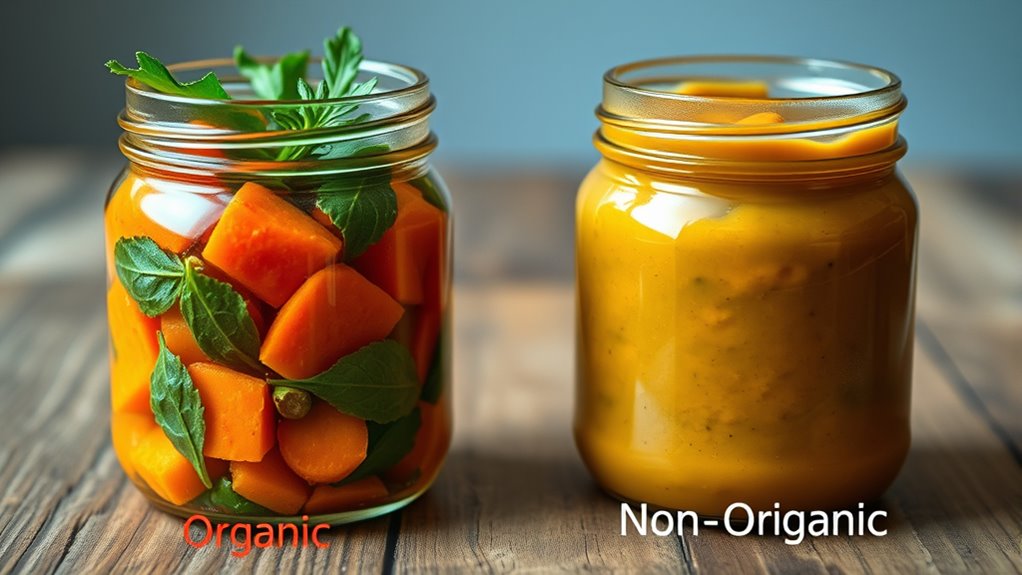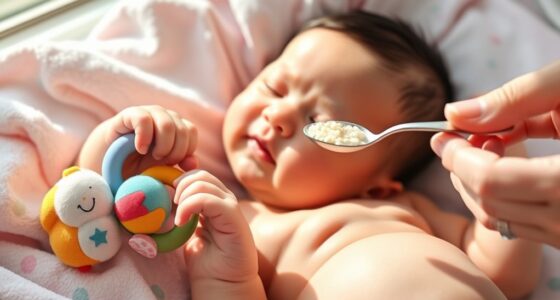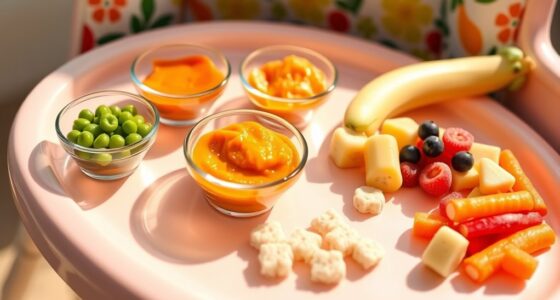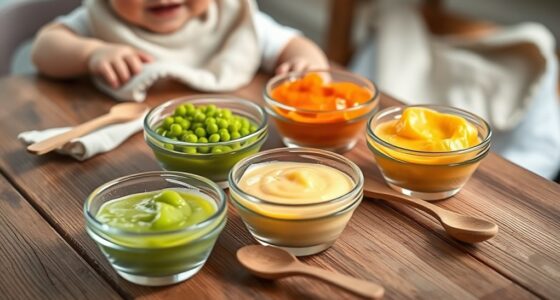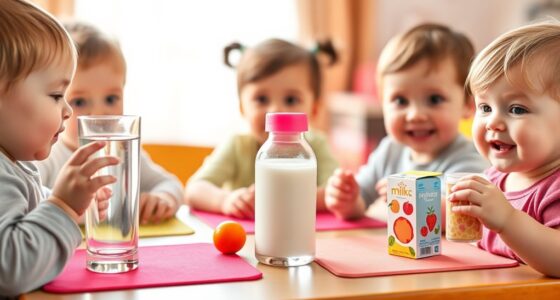Choosing organic versus non-organic baby food depends on your priorities. Organic options reduce pesticide exposure and may have higher antioxidant levels, but both provide essential nutrients and can be safe when properly washed. Budget considerations also matter, as organic foods tend to cost more. Ultimately, offering a varied, nutritious diet is most important for your baby’s growth. To discover more on how to balance safety, nutrition, and cost, keep exploring these options carefully.
Key Takeaways
- Organic baby foods generally have lower pesticide residues, reducing chemical exposure for infants.
- Nutritional differences are minimal; both provide essential vitamins and minerals necessary for growth.
- Organic options tend to be more expensive; budget considerations can guide selection.
- Washing fruits and vegetables thoroughly can significantly lower pesticide residues in non-organic foods.
- The overall diet quality and variety are more important than choosing between organic and non-organic foods.

Choosing between organic and non-organic baby food can be a challenging decision for parents who want the best for their little ones. One of the main concerns is pesticide residue. Non-organic foods often have higher levels of pesticides, which are chemicals used to protect crops from pests. Even with washing, some pesticide residues can remain on the surface of fruits and vegetables. In contrast, organic baby foods are grown without synthetic pesticides and fertilizers, reducing your baby’s exposure to these chemicals. While the levels of pesticide residue in non-organic foods are generally within safety limits, many parents prefer the peace of mind that comes with organic options, especially for their infants’ delicate systems.
Organic baby foods reduce pesticide exposure compared to non-organic options.
Another important factor is nutritional content. Many believe that organic baby foods offer superior nutrition, but research shows that the differences are often minimal. Both organic and non-organic produce can be rich in essential vitamins and minerals necessary for your baby’s growth and development. However, some studies suggest that organic produce may have higher levels of certain antioxidants and polyphenols, which are beneficial compounds that can support your baby’s immune system. Keep in mind, though, that the overall nutritional quality depends more on the variety and freshness of the food than whether it’s labeled organic or not.
Cost is a significant consideration, too. Organic baby foods tend to be more expensive due to the higher costs associated with organic farming practices. If budget constraints are a concern, you might choose to prioritize organic options for the most important or potentially contaminated foods, like berries or leafy greens, while opting for non-organic for others. It’s also worth noting that a balanced diet with a variety of fruits, vegetables, and grains—regardless of certification—can provide the necessary nutrients for healthy growth.
Ultimately, your choice between organic and non-organic baby food depends on your values, budget, and comfort level. While organic foods can reduce pesticide residue exposure and may offer some additional antioxidants, the most critical factor is providing your baby with a diverse, nutritious diet. Washing fruits and vegetables thoroughly, whether organic or not, also helps lower pesticide residues. Additionally, understanding the importance of auditory processing and sensory health can influence how you select foods that support your baby’s overall development. Remember, no matter what you choose, offering fresh, wholesome foods and fostering healthy eating habits will have the most positive impact on your little one’s development.
Frequently Asked Questions
Are Organic Baby Foods More Affordable Than Non-Organic Options?
When comparing prices, organic baby foods are generally more expensive than non-organic options because of higher production costs. You might notice a difference in price comparison, making organic choices less affordable for some families. Availability issues can also affect your options, as organic baby foods may not be as widely accessible in all stores. Ultimately, you need to weigh the cost and accessibility to decide what’s best for your family.
How Long Does Organic Baby Food Stay Fresh?
You’ll want to check the storage duration on the packaging, as it varies by type and brand. Typically, organic baby food stays fresh for about 24-48 hours once opened if refrigerated properly. Keep an eye out for spoilage indicators like sour smell, mold, or changes in texture. Always follow storage instructions to prevent spoilage and make sure your baby’s food stays safe and nutritious.
Can Non-Organic Baby Food Be Just as Nutritious?
You might wonder if non-organic baby food can be just as nutritious. The truth is, it can be, as many non-organic options retain similar nutritional content. However, you should consider pesticide residue, which might be higher in non-organic foods. While these foods can provide essential nutrients, choosing organic can reduce exposure to pesticides, giving you peace of mind that your baby gets nutritious food with fewer chemical residues.
Are Organic Baby Foods Safer for Babies With Allergies?
You might wonder if organic baby foods are safer for babies with allergies. Organic options often have lower pesticide residue, which can reduce exposure to potential allergens. While organic foods may lessen allergy risk related to chemical exposure, they don’t eliminate all allergy concerns. Always consult your pediatrician to identify specific allergens, but choosing organic could be a good step in minimizing chemical-related allergy risks for your little one.
Do Organic Baby Foods Contain More Pesticides Than Non-Organic?
Think of pesticide residue as a shadow cast by farming practices—more prominent in non-organic foods. Organic baby foods generally contain less pesticide residue because they follow stricter farming standards. While all foods may have some pesticide traces, non-organic options often have higher levels. So, if you’re aiming for minimal pesticide exposure, choosing organic can help, as it’s designed to reduce chemical use and promote healthier farming practices.
Conclusion
Ultimately, choosing organic or non-organic baby food depends on your priorities and comfort level. For example, imagine a parent opting for organic options to reduce pesticide exposure, feeling reassured that they’re giving their baby the purest start. While non-organic foods are safe and nutritious too, it’s about what matters most to you. Trust your instincts, do your research, and remember, the most important thing is providing your little one with healthy, loving nourishment.

